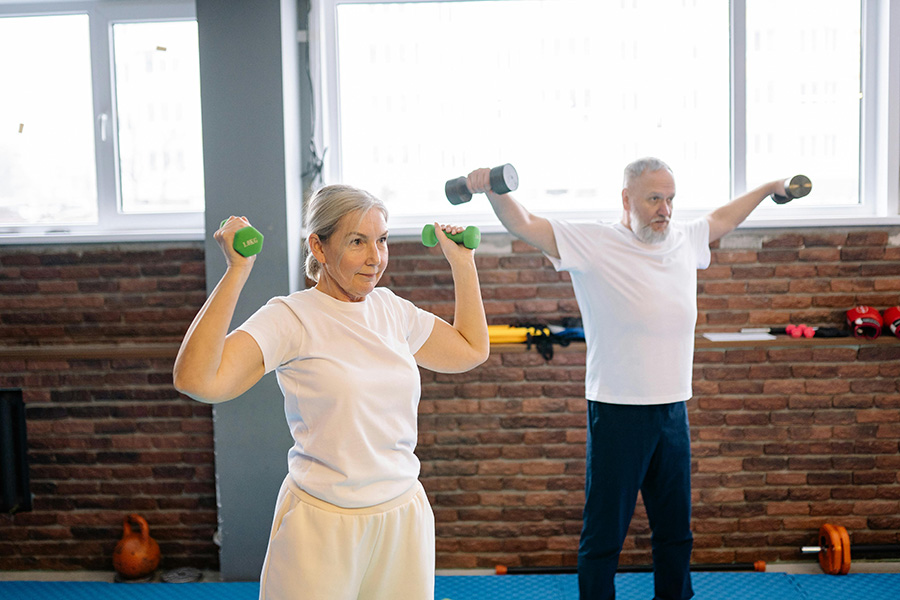As the days start getting shorter, it’s important to spend some time getting into good mental health habits.

Maintaining mental wellness becomes increasingly important as you navigate the changing seasons. Research consistently shows that simple, daily mental health exercises may improve our overall well-being and quality of life. The good news is that these practices don’t require special equipment or extensive training – they can easily become part of your everyday routine.
Mental health exercises work just like physical exercises: the more consistently you practice them, the stronger your mental resilience becomes. Studies from the American Psychological Association demonstrate that regular mental wellness activities can reduce stress, improve mood, and enhance cognitive function. These benefits are particularly valuable as the days grow shorter and we spend more time indoors. If you have questions about mental health, be sure to check in with your doctor for guidance. They will be equipped to help answer your questions. Let’s take a look at some easy mental health exercises to incorporate into your routine.
Start Your Day with Gratitude
Beginning each morning with gratitude sets a positive tone for the entire day. Keep a small notebook by your bedside and write down three things you appreciate before getting up. These can be basic ideas like a comfortable bed, a warm cup of coffee, a book you’re excited to read, or the sound of birds outside your window.
This exercise takes less than five minutes and creates a foundation of positivity that carries through your day. You might find yourself noticing more good things as you actively look for reasons to be grateful. The practice becomes easier and more natural over time, creating a habit that genuinely lifts your spirits.
Practice Deep Breathing Throughout the Day
Deep breathing exercises provide instant stress relief and can be done anywhere, anytime. The 4-7-8 technique works particularly well: inhale for four counts, hold for seven counts, and exhale for eight counts. This simple pattern activates your body’s relaxation response and helps calm racing thoughts. You can practice deep breathing while waiting in line, sitting in traffic, or during commercial breaks while watching television for a quick mental refresh.
Connect with Others Daily
Social connections play a crucial role in mental health, and even brief interactions can boost your mood significantly. Make it a goal to have at least one meaningful conversation each day, whether it’s with a family member, friend, neighbor, or store clerk. These connections don’t need to be lengthy.
Consider calling a friend you haven’t spoken to in a while, writing a thank-you note to someone who made a difference in your life, or joining a community group that interests you. Your local senior center, library, or community center may host activities that make connecting with others enjoyable and easy. If hearing loss makes phone calls difficult, try a CapTel Captioned Telephone that lets you read everything your caller says.
Move Your Body for Mental Benefits
Physical movement directly impacts mental well-being by releasing endorphins, your body’s natural mood-boosting hormone. You don’t need intense workouts to experience these benefits. Gentle activities like walking around the block, doing chair exercises, or dancing to your favorite music all count as mood-enhancing movement.
Indoor activities work wonderfully too, especially as the weather gets cooler. Try simple stretches while watching TV, walking up and down stairs a few extra times, or doing household tasks with extra energy and enthusiasm.
Create a Calming Evening Routine
Ending your day with intention helps process the day’s experiences and prepare your mind for restful sleep. Develop a calming routine that signals to your brain that it’s time to unwind. This might include reading a few pages of an uplifting book, listening to soothing music, journaling, or reflecting on the day’s positive moments. Consider keeping your evening routine technology-free to help your mind truly relax.
Practice Mindful Moments
Mindfulness doesn’t require anything but yourself. You can practice mindfulness while drinking your morning coffee by focusing on the taste, warmth, and aroma. You can be mindful while looking out the window, really noticing the colors, shapes, and movements you see. The key is starting small and building these moments naturally into your existing routine.
Keep Learning and Growing
Engaging your mind with new information or skills provides a sense of accomplishment and keeps your brain active. This could mean reading about a topic that interests you, learning a new recipe, working on puzzles, or trying a craft project. The process of learning itself boosts confidence and creates positive feelings.
Some libraries offer free classes and resources for lifelong learning, and many community centers provide workshops specifically designed for seniors. Online resources also make it easy to explore new interests from the comfort of your home. Consider involving friends in classes or hobbies for extra connection.
Building Your Personal Routine
The most effective mental health routine is one that fits naturally into your lifestyle and preferences. Start by choosing one or two exercises that appeal to you most and practice them consistently for a week or two before adding others. Remember that small, consistent actions create bigger changes. Your mental health routine should feel supportive and manageable rather than overwhelming or stressful.
Starting a mental health routine can be easy and rewarding, especially heading into the winter months. Start small and incorporate it into your daily routine. For more health topics, be sure to visit the CapTel blog.


